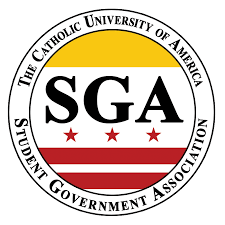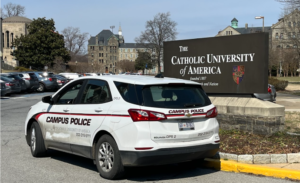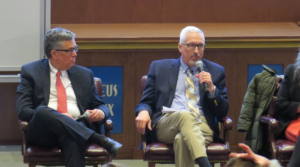SGA Senate Passes Three Pieces of Legislation, Addresses SGA Letter on In-Person Classes

Image Courtesy of Catholic University
By Anna Harvey
The Catholic University of America Student Government Association hosted its third meeting of the 2020-21 academic year on Monday, November 2. SGA Vice President Gemma del Carmen presided over the proceedings and senators participated via Zoom, using a reusable polling link to vote on appointments, agendas, minutes, amendments, and resolutions.
Session 6-03, held last Monday, covered three pieces of legislation and addressed a letter released by SGA on Instagram, which was delivered to the Executive at the Academic Senate without consulting all SGA Senators, and it encouraged non-exempt professors to return for in-person classes in the spring of 2021.
The session began with public comments. Over 80 participants joined the Zoom call, many of whom initially attended to support one of the resolutions, but took the opportunity to voice their concerns with SGA’s letter.
Regina Brennan, Sam McGrath, and Menstrual Equity Taskforce Director Chloe Van Syckel criticized the letter for not taking professors’ safety into account. Menstrual Equity Taskforce Associate Devin O’Donnell, who also lent her support to Resolution 003, which addressed third-party proctoring services, and stated that she regretted the letter from SGA on in-person classes was not shared with the entirety of SGA.
“Professors and faculty are not two-dimensional beings that exist only to lecture and grade our latest assignment or perform unseen administrative tasks,” O’Donnell said. “They are parents, spouses, children, grandchildren, and caretakers. These people are loved and are valued [as a] part of their own families and friends and have their own reasons to protect themselves and others against coronavirus.”
Seniors such as Daniel Madden and Julia Tyrie supported the letter, stating that reinstating in-person classes is essential to their senior year studies. Senior Sean O’Grady stated that for west coast students, keeping up with the time zone differences can majorly impact the quality of their education. Matthew Ziegler, a junior nursing major, and Caroline Ciocco, a nursing student and a prior senator, both supported the letter, citing concerns of not being able to properly care for their patients without learning proper procedures within in-person classes.
“The reality is that in my major, I could — depending on how I’m learning — kill someone from a lack of knowledge from kinesthetic learning. I don’t know how to properly give a shot right now, because I’m not able to learn that in class,” Ziegler said.
SGA Treasury Board Director Karla Martinez-Victoria spoke to the transparency of the institution and stated that the contents of the letter reflected the views of constituents who attended SGA office hours and petitioned for help. Pres. Sharpe commented on the letter, which was sent out last week and claimed he had previously gone over the letter with the Senate and other leaders before publicizing it.
“Last week, I informed the entire SGA, including the Senate, of SGA’s push to capable professors to return for in-person classes in the spring to the extent possible,” said Sharpe. “Having no objections to the letter, we proceeded to publicize it on our social media pages four days later in an effort to keep the undergraduate up-to-date on our work.”
SGA Treasurer Brenden Civitello and Anthony Apostolides, also spoke in favor of Resolution 003.
After the agenda and the minutes were adopted and approved, proceedings turned to committee reports. Chair of Rules and Administration Senator Kilgore reported that the committee met last Monday and discussed potential legislation. Within the next few weeks, the committee will present a bill that would amend the bylaws to address a line-item vote on the executive budget. Chair of the Committee on Academic Affairs Senator Zentz reported that the committee discussed Senator Sijgers Resolution 003 last Monday. They also discussed a resolution that would address the Study Abroad crisis plan. Chair of the Committee on University Services Senator Schlee reported that the committee met last Monday, and that each member met with a member of the administration in order to gain advice on specific pieces of legislation they were sponsoring. Chair on the Committee on Student Resources Senator Harrison stated that the committee met last week, and they discussed ideas for the year, particularly Spanish Tutoring services for upper-level language classes. Chair on the Committee on Campus Life Senator Bracey said the committee had its first meeting, and that they looked to focus on the Counseling Center and how campus life is impacted this semester, both on and off-campus.
Proceedings shifted to Resolution 003, which addressed proctoring and risks of student data breaches with the use of third-party lockdown browsers. The resolution would ban these third-party proctoring platforms in light of prior security breaches of students’ data and the browsers’ false notifications of cheating. The bill was sponsored by Sijgers and co-sponsored by Senator Lucardi, Schlee, and Zentz.
In her opening statements, Sijgers said many constituents expressed concerns regarding third-party lockdown browsers. She explained that many of these softwares interact with open applications and examine the student’s computer and the student’s physical surroundings via AI or a real-life person watching the test-taker. The proctor has the ability to question students during the exam if behaviors are flagged for cheating-like movements.
“Students who take exams on these platforms are often more worried about the lockdown browsers logging them incorrectly than they are about their ability to pass the exam itself,” Sijgers said.
Sijgers also mentioned that in July, ProctorU reported that 450,000 students had their data stolen. Furthermore, she reported, some companies, such as Respondus, have the ability to keep recordings of the students taking exams for up to five years. She stated that in light of these alarming facts, this middleman position between the students and a professor is unnecessary, and that professors can take other means to ensure that cheating won’t occur, such as application questions or essay questions.
The floor was afterward opened for debate. Senator Schmidt stated that he was incorrectly flagged for cheating during an exam when his neighbors in a seminary community began chanting prayers in their room.
Senator Hermann stated that nursing programs across the country require lockdown browsers, and removing the lockdown browsers may compromise the integrity of standardized exams. Sijgers responded that this would apply to tests only the university would give, rather than a national standardized exam required of nursing programs.
Senator Warren questioned if the ban would apply only to lockdown browsers, or would it apply to other measures professors would use online. Sijgers stated that the language specified that the ban would not include Turnitin — a platform that the university uses to check for plagiarism — since the software does not take control of a student’s computer.
Schlee supported the bill and also noted that many universities refuse to use third-party proctoring sites to begin with, and that proctoring sites violated these universities’ privacy policies.
The resolution passed with 25 yeas, 0 nays, and 1 absent.
Resolution 004, sponsored by Besendorfer and cosponsored by Schlee, Holcomb, and Zentz, addressed the topic of students receiving mail while in isolation due to COVID-19. Freshmen who are currently isolated in the Millenium South residence halls do not have the ability to receive mail. Reflecting upon the incoming return-to-campus plan, the resolution mandated that these isolated students should have the ability to request mail from Residence Life.
In her opening statement, Besendorfer stated that students in Millenium South halls need to receive their mail to make their time in isolation easier.
“I had a very productive meeting with the Community Director of Millennium South, Matt Maddatu,” said Besendorfer. “He thought that it was a very feasible request, and was going to continue to discuss this with the greater population of the staff.”
Sijgers and Holcomb both lent their support to the resolution. Harrison asked if Residence Life mentioned any reason why this mail delivery system was not already in place. He particularly mentioned that each day, the student in isolation is supposed to receive a phone call from a Community Director to ask if the student needs anything.
Besendorfer stated that one topic discussed during the meeting was medical needs, and she said that she was currently unaware of such a phone call. Schlee stated that this resolution could bring forward a new mail delivery system that would be well implemented by the time upperclassmen would get back to campus.
Senator Ahearn asked if this would violate a student’s medical privacy with respect to sharing a positive COVID-19 test among administration members. Schlee stated that the university in communication with Residence Life would not put forward a system that would violate such privacy; she also stated that medication non-related to COVID-19 is currently delivered to the rooms. Zentz stated that it is federal law to not open or tamper with mail that is addressed to students.
Senator Galassi questioned if other universities deliver mail on specific days of the week. He then asked if CUA could implement similar measures, and if so, would the new system apply solely to students in isolation or in quarantine. Besendorfer said that during her meeting, she brainstormed other ideas, but that the resulting mail system may differ from dorm to dorm.
The resolution passed with 25 years, 0 nays, and 1 absent.
The Senate then moved to extend the meeting until the completion of the agenda.
Resolution 005 was introduced to ensure student success on comprehensive exams. The resolution was sponsored by Schlee and cosponsored by Senator Buckley, Besendorfer, and Sijgers. It would primarily require departments to re-analyze the format and content of comprehensive exams, due to the online nature of fundamental classes over the past year.
In her opening remarks, Schlee stated that while this would not impact current seniors of the Class of 2021. . She stated that the comprehensive exams would still test on the material necessary to their major, but that departments should reform them so that students will be tested on material that they have actually learned in class. Schlee also stated that all seniors should have study materials made available to them a month before the scheduled comprehensive exam, since not all departments provide study guides and other such materials for seniors.
“We have to make sure that these exams are set up where it is truly testing the students on what they have been able to retain, on the information they actually learned, not what they should have learned,” said Schlee.
Sijgers, a cosponsor of the bill, pointed out that many issues students have with comprehensive exams have existed even before COVID-19, and that this resolution would implement a standard across the university.
Harrison stated that for many departments, comprehensive exams are not a department-based measure, but that they may extend beyond the scope of the university, such as those of biology exams. Schlee explained that she did not want comprehensive exams to be necessarily easy or canceled, but rather, she wanted comprehensive exams in the future to address content that students studied in their classes. She also recognized that changes would have to differ from department to department.
Sijers added that politics majors, in particular, were impacted by this situation, since many professors who taught introductory courses, upon which comprehensive exams were based, retired, and there were concerns on whether the material within these classes would be taught accurately. Harrison responded that since much of the concern came from the politics department, he questioned whether this initiative should be solely based on a department-by-department case, rather than implementing it on a large scope. Schlee stated that it was not just the politics department that had been negatively affected in this manner, and that also passing a resolution could be a more powerful statement than simply reaching out to each department.
Galassi lent his support to the resolution, saying that the Busch School of Business recently reevaluated its comprehensive exams, and that a majority of students consequently passed the exam.
The resolution passed with 24 yeas, 1 nay, 1 absent.
The proceedings moved to vice president updates. Del Carmen advertised the sophomore Town Hall with President Garvey, as well as a virtual luncheon with President Garvey. Del Carmen also gave advocacy updates, specifically that Resolution 001 prohibiting professors from requiring printed readings in online class had been advocated before the administration, and that the Resolution had been sent to professors. Del Carmen also reported that Resolution 002 for Africana Studies was brought before the Academic Senate. She said that the resolution will move forward, starting in consortium with other universities in the area, and eventually moving to its own program at CUA, since the university is in a difficult financial position due to COVID-19.
The proceedings then moved to open floor. The senators primarily discussed the topic of the letter that the SGA Executive put on its Instagram page that day. Bracey stated that her discontent with the SGA letter was not problematic in terms of content, but rather in the manner in which it was delivered to the students. She additionally commented that although many senators were sent the letter, it had already been sent to the administration, and the senators had not been given any context. Sijgers likewise voiced her concern, stating that professors ought to have the option to choose their own means of teaching. In addition, she stated that since this letter was of an academic nature, it ought to have been presented before her committee. Kilgore stated that the promulgation of the letter on social media was unprofessional, and that she experienced prior members of the SGA executive reach out to her and question why the letter was sent in this manner.
Lucardi dissented, saying that the actions taken by the SGA executive were not new, since many constituents reported to SGA that they wanted a safe return, and that the letter was not a demand. Zentz echoed what Lucardi said, and also stated that now would be the time to amend the legislative process for future processes. Senator Churilla supported changing the bylaws in order for the executive to inform senators in the future that such a letter or statement would be publicly published by SGA.
The meeting was adjourned, with the next meeting taking place on November 16 at 7 PM EST.






